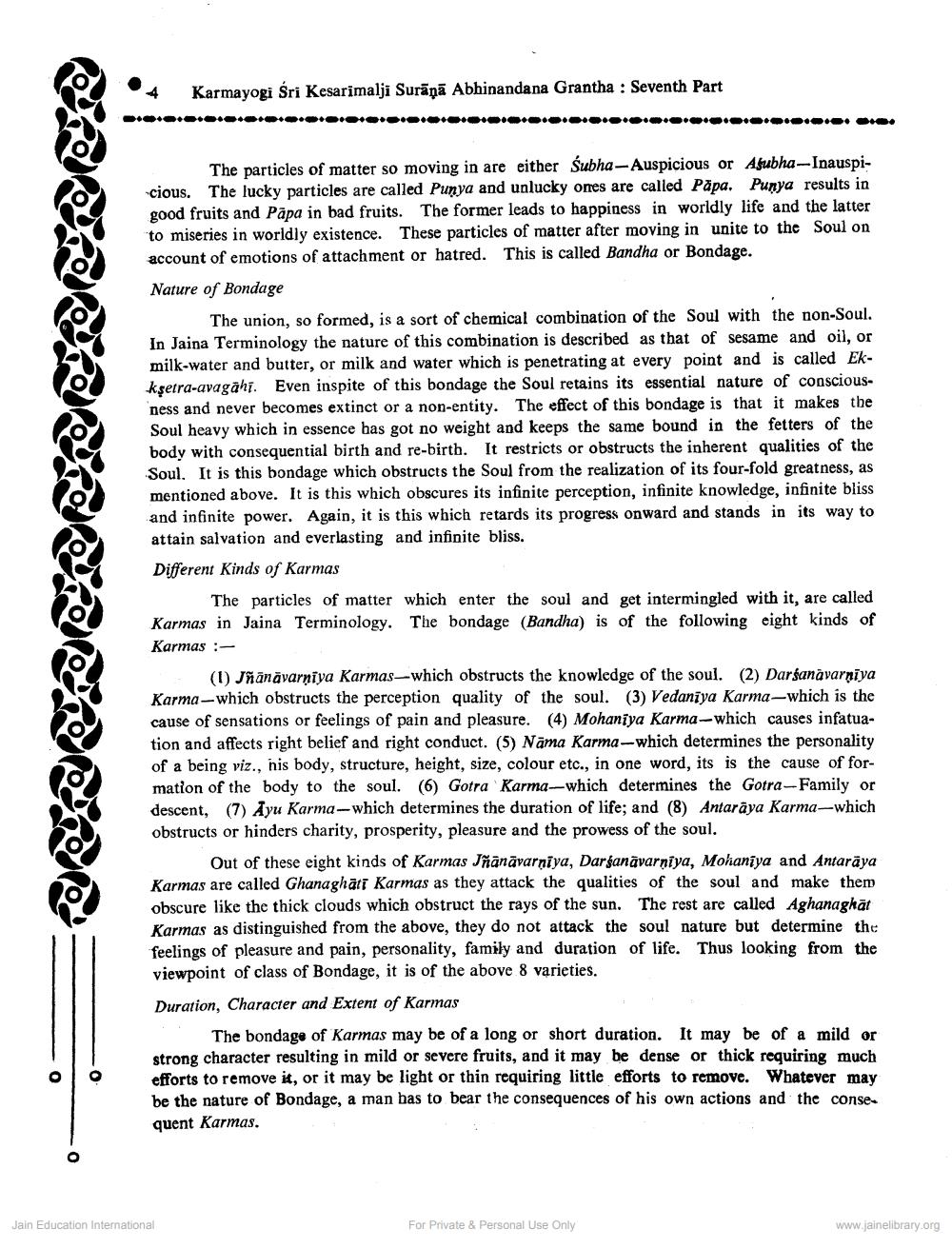________________
4
Karmayogi Sri Kesarimalji Surānā Abhinandana Grantha : Seventh Part
The particles of matter so moving in are either Subha-Auspicious or Asubha-Inauspicious. The lucky particles are called Punya and unlucky ones are called Păpa. Punya results in good fruits and Pāpa in bad fruits. The former leads to happiness in worldly life and the latter to miseries in worldly existence. These particles of matter after moving in unite to the Soul on account of emotions of attachment or hatred. This is called Bandha or Bondage. Nature of Bondage
The union, so formed, is a sort of chemical combination of the Soul with the non-Soul. In Jaina Terminology the nature of this combination is described as that of sesame and oil, or milk-water and butter, or milk and water which is penetrating at every point and is called Ekksetra-avagahi. Even inspite of this bondage the Soul retains its essential nature of consciousness and never becomes extinct or a non-entity. The effect of this bondage is that it makes the Soul heavy which in essence has got no weight and keeps the same bound in the fetters of the body with consequential birth and re-birth. It restricts or obstructs the inherent qualities of the Soul. It is this bondage which obstructs the Soul from the realization of its four-fold greatness, as mentioned above. It is this which obscures its infinite perception, infinite knowledge, infinite bliss and infinite power. Again, it is this which retards its progress onward and stands in its way to attain salvation and everlasting and infinite bliss. Different kinds of Karmas
The particles of matter which enter the soul and get intermingled with it, are called Karmas in Jaina Terminology. The bondage (Bandha) is of the following eight kinds of Karmas :
(1) Jñanävarniya Karmas-which obstructs the knowledge of the soul. (2) Darsangvarṇīya Karma - which obstructs the perception quality of the soul. (3) Vedanīya Karma-which is the cause of sensations or feelings of pain and pleasure. (4) Mohanīya Karma-which causes infatuation and affects right belief and right conduct. (5) Nama Karma---which determines the personality of a being viz., his body, structure, height, size, colour etc., in one word, its is the cause of formation of the body to the soul. (6) Gotra Karma--which determines the Gotra - Family or descent, (7) Ayu Karma-which determines the duration of life; and (8) Antarāya Karma-which obstructs or hinders charity, prosperity, pleasure and the prowess of the soul.
Out of these eight kinds of Karmas Jñānāvarniya, Darsanāvarniya, Mohanīya and Antarāya Karmas are called Ghanaghāti Karmas as they attack the qualities of the soul and make them obscure like the thick clouds which obstruct the rays of the sun. The rest are called Aghanaghāt Karmas as distinguished from the above, they do not attack the soul nature but determine the feelings of pleasure and pain, personality, family and duration of life. Thus looking from the viewpoint of class of Bondage, it is of the above 8 varieties. Duration, Character and Extent of Karmas
The bondage of Karmas may be of a long or short duration. It may be of a mild or strong character resulting in mild or severe fruits, and it may be dense or thick requiring much efforts to remove it, or it may be light or thin requiring little efforts to remove. Whatever may be the nature of Bondage, a man has to bear the consequences of his own actions and the consequent Karmas.
Jain Education International
For Private & Personal Use Only
www.jainelibrary.org




